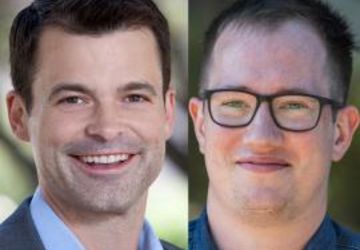Jan G. Voelkel

Jan G. Voelkel is a PhD candidate in Sociology and a member of the Polarization and Social Change lab at Stanford University.
Jan's research examines under which conditions micro-level preferences for more equality and unity influence macro-level outcomes, such as elections. For example, Jan’s research has examined under what conditions Americans (i) refuse undemocratic elites, (ii) support women candidates for president, and (iii) back economically progressive politicians. In his dissertation work, Jan led the Strengthening Democracy Challenge, a megastudy that tested 25 crowdsourced experimental treatments for reducing anti-democratic attitudes and partisan animosity.
Jan’s research has been published in journals, such as Proceedings of the National Academy of Sciences, Nature Human Behaviour, PNAS Nexus, and Psychological Science. His research has been covered by media outlets, such as The New York Times, the Washington Post, and The Atlantic.
At Stanford, Jan is the Michelle and Kevin Douglas Interdisciplinary Graduate Fellow and a former Philanthropy and Civil Society Fellow and Stanford Impact Labs Fellow. Jan has won the Open Science Innovator Award, the Barbara and Sandy Dornbusch Award for Best Paper in Social Psychology, and the Leila Arthur Cilker Award for Outstanding Teaching Assistance.
Before his dissertation work, Jan earned a MA in Sociology from Stanford University, a MS in Social and Behavioral Sciences from Tilburg University, and a BS in Social Sciences from the University of Cologne. In his spare time, Jan enjoys moral dilemmas, plays racket sports, and plans political murder mystery parties.
Latest Publications
Journal Articles & Book Chapters
Druckman, J. N., Kang, S., Chu, J., Stagnaro, M. N., Voelkel, J. G., Mernyk, J. S., Pink, S. L., Redekopp, C., Rand, D. G., & Willer, R. (2023). Correcting exaggerated meta-perceptions reduces American legislators’ support for undemocratic practices. Proceedings of the National Academy of Sciences of the United States of America, 120(23), e2301836120. doi:10.1073/pnas.2301836120
Grossmann, I., Rotella, A., Hutcherson, C., Sharpinskyi, K., Varnum, M. E., Achter, S., …, Voelkel, J. G., …, & Wilkening, T. (2023). Insights into accuracy of social scientists' forecasts of societal change. Nature Human Behaviour, 7, 484–501 (2023). doi:10.1038/s41562-022-01517-1
Voelkel, J. G., Chu, J., Stagnaro, M. N., Mernyk, J., Pink, S., Redekopp, C., Druckman, J., Rand, D., & Willer, R. (2023). Interventions reducing affective polarization do not improve anti-democratic attitudes. Nature Human Behaviour, 7(1), 55-64. doi:10.1038/s41562-022-01466-9
Pink, S. L., Stagnaro, M. N., Chu, J., Mernyk, J. S., Voelkel, J. G., & Willer, R. (2023). The effects of short messages encouraging prevention behaviors early in the COVID-19 pandemic. PLOS ONE, 18(4), e0284354. doi:10.1371/journal.pone.0284354
Jeremy Freese, Tamkinat Rauf, and Jan Gerrit Voelkel. 2022. “Advances in Transparency and Reproducibility in the Social Sciences.” Social Science Research.
Santos, L. A., Voelkel, J. G., Willer, R., & Zaki, J. (2022). Belief in Empathy as a Political Resource Reduces Partisan Animosity and Facilitates Persuasion. Psychological Science, 33(9), 1557-1573. doi:10.1177/09567976221098594
Voelkel, J. G., Malik, M., Redekopp, C., & Willer, R. (2022). Changing Americans’ attitudes about immigration: Using moral framing to bolster factual arguments. The ANNALS of the American Academy of Political and Social Science, 700(1), 73-85. doi: 10.1177/00027162221083877
Voelkel, J. G., & Freese, J. (2022). Open computational social science. In U. Engel, A. Quan-Haase, S. Xun Liu, & L.E. Lyberg (Eds.), Handbook of computational social science. Volume 1 theory, case studies and ethics. Routledge. ISBN 9780367456528.
Corbett, Christianne*, Jan Voelkel*, Marianne Cooper, and Robb Willer. 2022. “Pragmatic Bias Impedes Women’s Access to Political Leadership.” Proceedings of the National Academy of Sciences of the United States of America 119(6) (*equal authorship)
Voelkel, J. G., Ren, D., & Brandt, M. J. (2021). Inclusion reduces political prejudice. Journal of Experimental Social Psychology, 95, 104149. doi:10.1016/j.jesp.2021.104149
Voelkel, J. G., & Brandt, M. J. (2019). The effect of ideological identification on the endorsement of moral values depends on the target group. Personality and Social Psychology Bulletin, 45(6), 851-863. doi:10.1177/0146167218798822.
Voelkel, J. G., Brandt, M. J., & Colombo, M. (2018). I Know That I know Nothing: Can Puncturing the Illusion of Explanatory Depth Overcome the Relationship Between Attitudinal Dissimilarity and Prejudice? Comprehensive Results in Social Psychology 3(1),56-78. doi:10.1080/23743603.2018.1464881.
Voelkel, J. G., & Feinberg, F. (2018). Morally reframed arguments can affect support for political candidates." Social Psychological and Personality Science, 9(8), 917-924. doi:10.1177/1948550617729408.
van Doorn, J., van den Bergh, D., Bohm, U., Dablander, F., Derks, K., Draws, T., Etz, A., Evans, N., Gronau, Q., Hinne, M., Kucharsky, S., Ly, A., Marsman, M., Matzke, D., Raj, A., Sarafoglou, A., Stefan, A., Voelkel, J. G., & Wagenmakers, E.-J. (2021). The JASP guidelines for conducting and reporting a Bayesian analysis. Psychonomic Bulletin & Review. doi: 10.3758/s13423-020-01798-5
van den Bergh, D., van Doorn, J., Marsman, M., Draws, T., van Kesteren, E. J., Derks, K., Dablander, F., Gronau, Q. F., Kucharsky, S., Komarlu Narendra Gupta, A. R., Sarafoglou, A., Voelkel, J. G., Stefan, A., Ly, A., Hinne, M., Matzke, D., & Wagenmakers, E.-J. (2020). A tutorial on conducting and interpreting a Bayesian ANOVA in JASP. LAnnee Psychologique, 120(1), 73-96. doi:10.3917/anpsy1.201.0073
